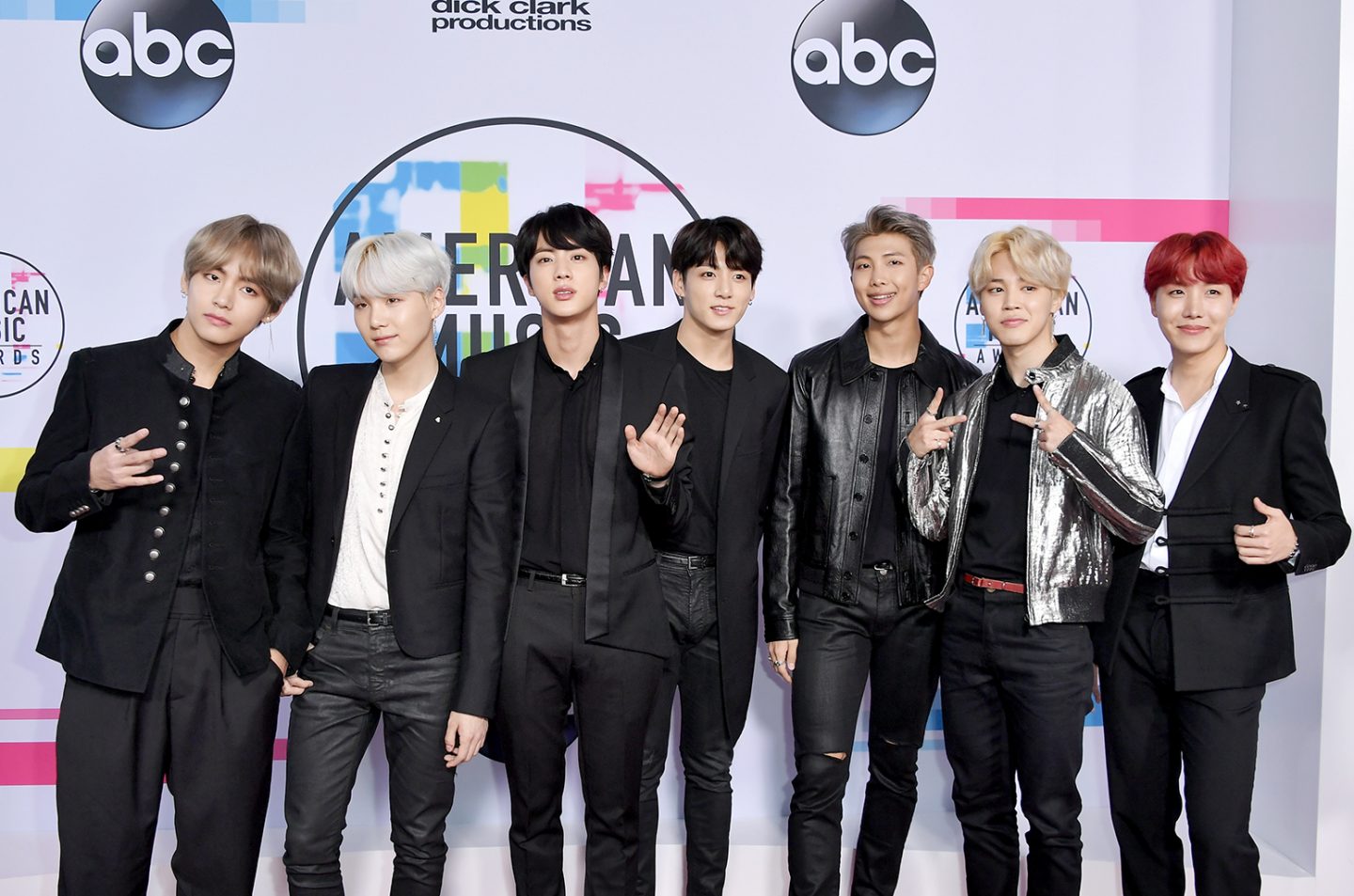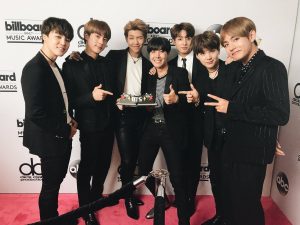 With 2017 flying past and 2018 coming in the picture, BTS has skyrocketed to new and unfamiliar territory. The seven-membered group has attended two U.S. award shows, became the first K-Pop act to enter the Top 40 on the Billboard Hot 100, and had a successful U.S. leg of the Wings World Tour. It’s safe to say that the group is no longer just a South Korean act, but an internationally recognized one, becoming a source of strong national pride.
With 2017 flying past and 2018 coming in the picture, BTS has skyrocketed to new and unfamiliar territory. The seven-membered group has attended two U.S. award shows, became the first K-Pop act to enter the Top 40 on the Billboard Hot 100, and had a successful U.S. leg of the Wings World Tour. It’s safe to say that the group is no longer just a South Korean act, but an internationally recognized one, becoming a source of strong national pride.
There’s a lot of discussion regarding where their success and musical direction may take them from this point forward, but there isn’t enough discourse on how they are being covered in western mainstream entertainment media. Surely, the swelling pride of seeing BTS on The Ellen DeGeneres Show was emotional and monumental for fans and non-fans alike, but with genuine great moments like that are rare. Genuine interest for BTS, or just K-Pop entering the western musical landscape in general, are rare.
One can argue that the sudden overwhelming press coverage is a sign of their international appeal, and it provides a positive outlook for Asian representation in the entertainment industry. Buzzfeed’s article addressing the racist remarks on Twitter after their Billboard win shows that, but what other positives come out of it?
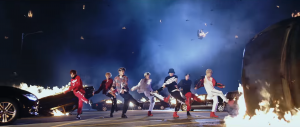 On the promotional front, we have yet to see more of BTS’s music getting radio play besides their recently promoted “Mic Drop” remix, or many outlets following up on them since their American Music Awards (AMA) performance. If we were to analyze the media coverage during their time in Los Angeles, it was incredibly superficial. Some articles had incorrect information on the group, other outlets were incredibly obvious in generating content for clicks, and others construct an agenda that may not favor the group or K-pop as a whole. If BTS has a chance of crossing over and invoke a Beatlemania 2.0, then why doesn’t western media treat them as such? What does that mean for BTS?
On the promotional front, we have yet to see more of BTS’s music getting radio play besides their recently promoted “Mic Drop” remix, or many outlets following up on them since their American Music Awards (AMA) performance. If we were to analyze the media coverage during their time in Los Angeles, it was incredibly superficial. Some articles had incorrect information on the group, other outlets were incredibly obvious in generating content for clicks, and others construct an agenda that may not favor the group or K-pop as a whole. If BTS has a chance of crossing over and invoke a Beatlemania 2.0, then why doesn’t western media treat them as such? What does that mean for BTS?
It’s hard not to be excited to see the explosive and overwhelming press coverage of BTS last year. They attended the Billboard Music Awards and won the Top Social Media Artist award last May — a first in K-Pop history for a group to win such an award. They also performed at the American Music Awards and had their official U.S. television debut — also another first for a K-Pop group — and attended a few well-known talk shows such as The Late Late Show With James Corden and Late Night with Jimmy Kimmel. That arguably was groundbreaking.
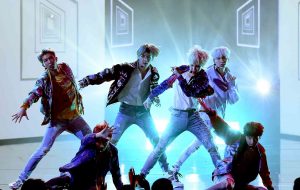 It’s important to note how aware western media are of their popularity. The producers who book them to be on these shows know their star power. These shows, despite being announced barely a week or two in advance, still garnered sold out tapings and intense campouts by hundreds of fans outside of the studios. Both Billboard and AMAs found their venues filled with ARMY as well, and if not inside, there were quite a few with supportive banners and light sticks outside.
It’s important to note how aware western media are of their popularity. The producers who book them to be on these shows know their star power. These shows, despite being announced barely a week or two in advance, still garnered sold out tapings and intense campouts by hundreds of fans outside of the studios. Both Billboard and AMAs found their venues filled with ARMY as well, and if not inside, there were quite a few with supportive banners and light sticks outside.
Other news outlets never fail to film and broadcast copious footage of international ARMY at every event they attended. This is easily BTS’ biggest strength: their ability to bring a bunch of ARMY together at any given time for absolutely anything. Fans show up, and the rest of the world becomes fascinated and curious. The western entertainment media shows up as well, making sure their cameras are rolling to capture even a millisecond of them because they know they can generate clicks and views from that moment alone.
In addition, with BTS made up of all Korean men, the subject of representation also comes up. This became a huge topic of discussion after their Billboard win, as Buzzfeed showcased the racist tweets and social commentary. Tran, one of the commenters, noted that BTS’ win “set the goal”, and brought up the issue of Asian artists not being recognized enough to step outside of their niches. One can argue that the constant coverage of the group makes it acceptable for western mainstream media to discover more Asian and Asian American artists.
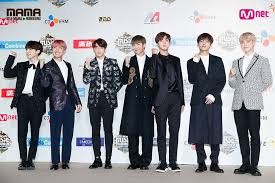 While the message and sentiment are there and helpful to the overall political discourse regarding Asian representation in media, the change is slow, but steady. Western mainstream media still doesn’t take time to cover Asian American artists and other Asian artists who are making waves internationally, and the nuances of representation are still under heavy discussion. Because of this, the focus is still solely on BTS, or more accurately, as Kai from Bergamot and Vanilla succinctly puts it, the coverage focuses a lot on the “foreign-ness” of the group, that “they’re unusual—they don’t speak English and have a totally different culture”.
While the message and sentiment are there and helpful to the overall political discourse regarding Asian representation in media, the change is slow, but steady. Western mainstream media still doesn’t take time to cover Asian American artists and other Asian artists who are making waves internationally, and the nuances of representation are still under heavy discussion. Because of this, the focus is still solely on BTS, or more accurately, as Kai from Bergamot and Vanilla succinctly puts it, the coverage focuses a lot on the “foreign-ness” of the group, that “they’re unusual—they don’t speak English and have a totally different culture”.
This can be evidently seen, in most of the in-person interviews during their AMA week, as they always start off how excited they are to be here, followed by how honored they are to be in America. While the members express their genuine excitement and nervousness, the press makes a huge emphasis on this, enforcing the “foreigner” narrative. The interviews also often ask who are their favorite western artists, celebrities, and other western mass media, not once mentioning if they may have their favorite film, artist, show, etc. outside of the western entertainment realm.
https://youtu.be/nuzSF0A6lqU
Arguably, BTS has been treated better than their seniors. Instead of being treated as a caricature like Psy during his Gangnam Style era or being forced to change their looks and sounds like Wonder Girls and Boa, BTS has been unapologetically themselves since western entertainment media has their eyes on them. Besides the “Mic Drop” remix, they haven’t made English versions of their songs, and don’t seem to have plans to do so. This kind of empowerment didn’t exist in other groups that tried to do well here, or at least, their companies didn’t choose to market them in the same way.
During their American engagements, BTS aren’t shy in representing the Korean music scene they come from. Unfortunately, it seems that western mainstream media doesn’t seem to care about that context. This can be seen in a few articles written on them in which they gave incorrect information, indicating their poor research on the group, like Rolling Stone‘s article written just after their Billboard Music Award win. In the piece, the writer mentions that BTS “write and produce socially conscious K-Pop”, bringing up that Psy and other acts write catchy songs that are geared towards the Western mainstream audience.
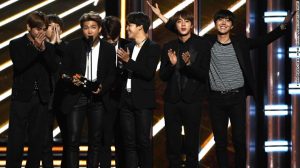 What the writer failed to acknowledge is that Psy’s international hit, “Gangnam Style”, was satirically made to poke fun of Gangnam elites, and that message was lost within the flurry of western media turning him into a racist caricature. A more recent and very offensive example was NBC Chicago covering the late Shinee member Jonghyun’s death by incorrectly showing Rap Monster and saying he was on Ellen and performed at the American Music Awards. Following backlash, the news show issued an apology, showing a video clip of Shinee’s most recent single without Jonghyun in it.
What the writer failed to acknowledge is that Psy’s international hit, “Gangnam Style”, was satirically made to poke fun of Gangnam elites, and that message was lost within the flurry of western media turning him into a racist caricature. A more recent and very offensive example was NBC Chicago covering the late Shinee member Jonghyun’s death by incorrectly showing Rap Monster and saying he was on Ellen and performed at the American Music Awards. Following backlash, the news show issued an apology, showing a video clip of Shinee’s most recent single without Jonghyun in it.
In addition to the inaccuracy, western mainstream media is using BTS for website/video views, which has been the main major argument among fandom circles when critiquing the western mainstream media. This was evident after BTS’ historic Billboard win: the music website deliberately and overtly used pictures of BTS as the main photo for the Billboard Music Awards. BTS has shown time and time again they can bring overwhelmingly huge foot traffic, and as Beyond Hallyu puts it, “it means that mainstream Western sites have figure (sic) out that K-Pop is marketable, which of course it is”.
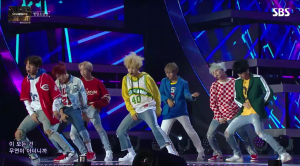 Forbes also committed this offense, mentioning BTS in the headline and article, but talked about how K-Pop is prospering in the U.S. due to the Korea-China THAAD crisis. While it is an important topic of discussion, it should’ve shifted the focus on how BTS was able to make their official televised debut performance, which was unrelated to the crisis. While BTS’ success has an impact on the genre’s popularity in the U.S., the group’s personal success should also be celebrated too. How did Big Hit Entertainment get BTS to this point? Did they plan this out when they debuted the group? What did they do that other companies struggled to do in the past several years?
Forbes also committed this offense, mentioning BTS in the headline and article, but talked about how K-Pop is prospering in the U.S. due to the Korea-China THAAD crisis. While it is an important topic of discussion, it should’ve shifted the focus on how BTS was able to make their official televised debut performance, which was unrelated to the crisis. While BTS’ success has an impact on the genre’s popularity in the U.S., the group’s personal success should also be celebrated too. How did Big Hit Entertainment get BTS to this point? Did they plan this out when they debuted the group? What did they do that other companies struggled to do in the past several years?
These topics are not being explored. Many other western entertainment media sites, including Insider, People, Fashion Magazine, and ET Online post quite a “get to know BTS” articles, where they bring up facts about the members despite it being easily searchable. They don’t provide any substance, or further discourse about the group’s musical direction or growing international fame, which is incredibly unfortunate because who wouldn’t want to read more genuine and honest articles like that?
 It’s a struggle to find a western entertainment site writing a great piece on BTS without running into some issues, but that’s something we all must get used to. BTS is now a K-pop group with immense international popularity, and Big Hit will continue to subtly market them for the world music stage. The western entertainment media, in all its sensationalized glory, is not perfect; but in retrospect of the previous acts they’ve covered, they continue to make progress in covering BTS. Hopefully, the more the act returns to the U.S. for another promotion — and as more fans demand better content — we’ll see the coverage grow and gain more depth.
It’s a struggle to find a western entertainment site writing a great piece on BTS without running into some issues, but that’s something we all must get used to. BTS is now a K-pop group with immense international popularity, and Big Hit will continue to subtly market them for the world music stage. The western entertainment media, in all its sensationalized glory, is not perfect; but in retrospect of the previous acts they’ve covered, they continue to make progress in covering BTS. Hopefully, the more the act returns to the U.S. for another promotion — and as more fans demand better content — we’ll see the coverage grow and gain more depth.
This piece was written by Katie Doan, an 22 year old aspiring pop culture and entertainment journalist from Orange County. Find her on Twitter at @doanhis_.
(YouTube, Buzzfeed, Forbes, Rolling Stone, Images via Big Hit, SBS, Mnet, NBC, ABC.)
